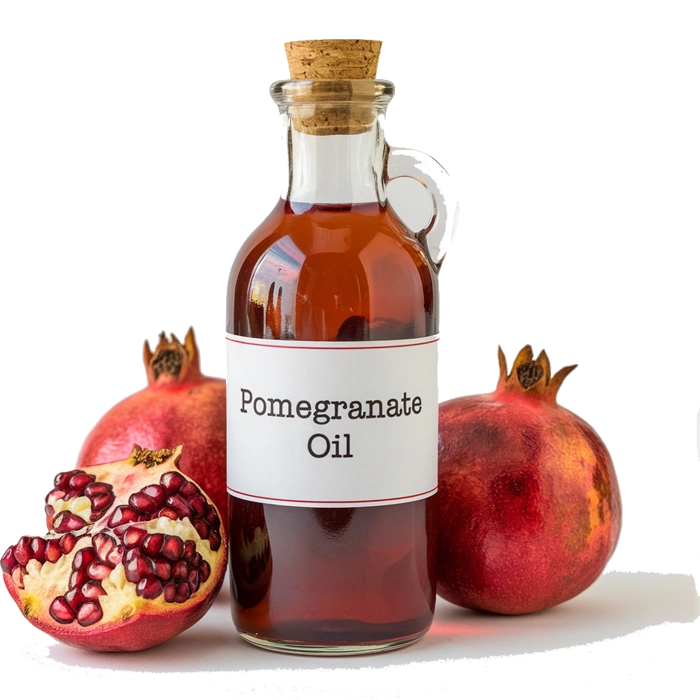
Nutritional properties of Pomegrant oil
Energy :
None Kcal / 100g
Category : Oils and Fats
Group : Vegetable Oils & Fats
Composition And Nutritional Value :Pomegranate oil is derived from the seeds of the pomegranate fruit and is known for its rich composition of unsaturated fatty acids, primarily punicic acid, an omega-5 fatty acid, which is unique to pomegranate oil. It also contains linoleic acid, oleic acid, and palmitic acid, which contribute to its anti-inflammatory and antioxidant properties. Pomegranate oil is high in vitamin E, polyphenols, and flavonoids, all of which are beneficial for the skin and overall health. This oil is also a source of sterols and tocopherols, compounds that support cellular regeneration and have a nourishing effect on the skin. Nutritionally, pomegranate oil is not typically consumed for its direct energy value but is used primarily in cosmetic and skincare products.
Health Benefits :
Anti-Inflammatory Properties: The high level of punicic acid and other omega fatty acids helps reduce inflammation in the body, potentially benefiting those with conditions like arthritis or inflammatory skin disorders.
Skin Health: Pomegranate oil is well-known for its ability to improve skin health due to its antioxidants, including vitamin E. It can help moisturize dry skin, improve elasticity, and reduce the appearance of fine lines and wrinkles.
Antioxidant Protection: The flavonoids and polyphenols in pomegranate oil provide powerful antioxidant protection, helping to fight free radicals that cause skin aging and other oxidative stress-related health issues.
Heart Health: Pomegranate oil may contribute to heart health by promoting a healthy balance of cholesterol levels, as the omega-5 fatty acids help reduce LDL cholesterol and support overall cardiovascular function.
Wound Healing: Pomegranate oil has been shown to support wound healing and reduce scarring due to its ability to promote cell regeneration and encourage the formation of new tissue.
Culinary Uses : While pomegranate oil is mostly used for cosmetic and skincare purposes, it can also be used in cooking due to its rich flavor profile and health benefits. It has a fruity and nutty taste and can be drizzled over salads, used as a finishing oil for grilled meats or vegetables, or mixed into dressings and marinades. Pomegranate oil is best used as a cold-pressed oil to retain its delicate flavor and nutrient properties. It can also be used in smoothies for a boost of healthy fats.
Types :
Cold-Pressed Pomegranate Oil: This is the highest-quality oil, extracted through cold pressing, which retains the full spectrum of nutrients and flavor.
Refined Pomegranate Oil: This oil has been processed and filtered to remove impurities, resulting in a lighter color and less strong flavor. It is generally used for cosmetic purposes but may have a lower nutrient content compared to cold-pressed varieties.
Organic Pomegranate Oil: This version is made from organically grown pomegranates and is free from pesticides and synthetic chemicals, making it a great choice for natural skincare or cooking.
Pomegranate Seed Oil Blends: Sometimes, pomegranate oil is mixed with other oils, like argan oil or jojoba oil, for enhanced skin benefits or a more neutral flavor for culinary uses.
Shopping And Storage Tips :
Selecting Pomegranate Oil: Look for cold-pressed and organic options to ensure you are getting the highest quality oil with maximum nutrients. Make sure to check the expiration date, as oils can go rancid over time.
Storage: Pomegranate oil should be stored in a dark, cool place away from direct sunlight and heat. A dark glass bottle helps protect the oil from light, which can degrade its nutrients.
Shelf Life: Pomegranate oil typically has a shelf life of 1 to 2 years when stored properly. Keep the cap tightly closed to prevent oxidation and maintain its effectiveness.
Usage Tips: Since pomegranate oil is quite rich, a little goes a long way in both cooking and skincare. Use a few drops as a moisturizer or massage oil for targeted treatments. In cooking, drizzle it over dishes or use it in place of other oils for a unique flavor.

